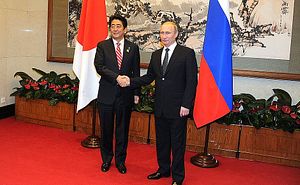Japanese Prime Minister Shinzo Abe’s meeting with Russian President Vladimir Putin in Sochi on May 6 was met with positive reactions from both countries and gave grounds for cautious optimism regarding going forward with the peace treaty negotiations and making progress on the Northern Territories dispute. As I wrote of Abe’s visit:
[T]he immediate results of Abe’s visit to Russia can be construed as successful — the agenda, traditionally centered on the disputed islands, has been updated with plans for strengthened energy ties; the bilateral relations have seemingly been imbued with a positive dynamic; and Abe has the vaguely phrased agreement of moving the territorial dispute forward to present to Japanese voters ahead of the Upper House elections.
Moreover, the days surrounding Abe’s trip to Sochi were filled with promising signs for the thawing of the bilateral relationship, which never quite recovered after deteriorating during the Ukrainian crisis. Shortly before Abe’s visit, Putin’s spokesman Dmitry Peskov called the territorial dispute an “extremely sensitive” subject that should be discussed meticulously by experts, a shift from Moscow’s earlier emphatic denial of the issue’s very existence. Moreover, in the wake of the meeting, Russian Deputy Prime Minister Yuri Trutnev made a trip to Tokyo to discuss with Deputy Chief Cabinet Secretary Hiroshige Seko joint economic projects in the Russian Far East as part of Abe’s proposed economic cooperation plan. Finally, the two countries’ Foreign Ministries are scheduled to hold talks on the peace treaty in June.
However these events were soon tainted by a series of developments which highlighted the harsh geopolitical realities in which Russia and Japan are enmeshed, and put into question the possibility of a substantial improvement in bilateral relations.
On May 16, the first Russia-Japan visa-free exchange in 2016, which allows the Russians living on South Kuril islands to make trips to Japan, and the Japanese to visit the disputed islands, was tarnished by a diplomatic incident. A delegation of Japanese citizens was making a visit to the small uninhabited Tanfilyev island to pay respects to the graves of their family members who died when the island still belonged to Japan. However, Russia denied them entry because when they were filling out the paperwork they referred to the island by its Japanese name, Suisho. Or at least that was the reason provided by Russia’s Foreign Ministry. Japanese Chief Cabinet Secretary Yoshihide Suga, however, was quick to offer an alternative version of the incident, saying that the visit had fallen through due to bad weather, and the delegation had instead conducted a burial service at sea near Nemuro city. The statement is a tell-tale sign of Tokyo’s reluctance to cause even insignificant damage to the current state of bilateral ties in hopes of breaking the South Kurils impasse.
Meanwhile, Russia’s commitment to stepping up political dialogue with Japan appears lukewarm if its recent official statements on the Northern Territories are anything to go by. At the ASEAN summit in Sochi, Putin stated that, while Russia is ready to discuss signing a peace treaty with Japan, the option of “selling” the islands to Japan is not on the table. A few days later, Foreign Minister Sergey Lavrov gave an interview to the tabloid Komsomolskaya Pravda in which he emphasized that Russia is not planning to cede the disputed territories to Japan, and neither is it “begging” for a peace treaty. Lavrov reverted to the traditional mantra about World War II putting an end to the issue of the islands’ ownership.
By the same token, Moscow’s expectations of Japan mediating a normalization of relations between Russia and the West have experienced a clear setback in the form of the strongly-worded passage related to Russia in the declaration signed by the G7 leaders at the latest summit in Ise Shima. Not only were the anti-Russian sanctions reaffirmed but further restrictive measures were not ruled out either. Further, the onus of fully implementing the Minsk agreements with regard to Ukraine was placed on Moscow itself, not the unrecognized People’s Republics in Donetsk and Luhansk. Regardless of Tokyo’s desire to act as a go-between in the feud between the West and Russia, the categorical nature of the declaration raises questions about Abe’s capacity to actually influence his fellow G7 leaders.
Finally, Russia has over the last weeks signaled the intention of ratcheting up its military presence in its Far East, including the disputed islands. According to Colonel-General Sergey Surovikin, the commander of Russia’s Eastern Military District, the government is taking “unprecedented measures” in upgrading military infrastructure and rearming the troops on Sakhalin and the Kuril islands, which he called “Russia’s Eastern outpost.” Moreover, there are plans to use the uninhabited island of Matua (or Matsuwa in Japanese) as a naval base for the Russian Pacific Fleet. These are just the latest steps in Moscow’s endeavors to reinforce its Eastern frontier.
The events that unfolded over the last few weeks signify that there has been no discernible shift in Russia’s rhetoric or actions vis-a-vis Japan since Abe’s meeting with Putin, whereas Tokyo can only do so much in its attempts to allay tension between Moscow and the West. This circumstances cast doubts on whether Putin’s planned visit to Japan later this year will, too, turn out to be little more than a talk fest.
Dmitry Filippov is a PhD candidate at the School of East Asian Studies, the University of Sheffield.
































